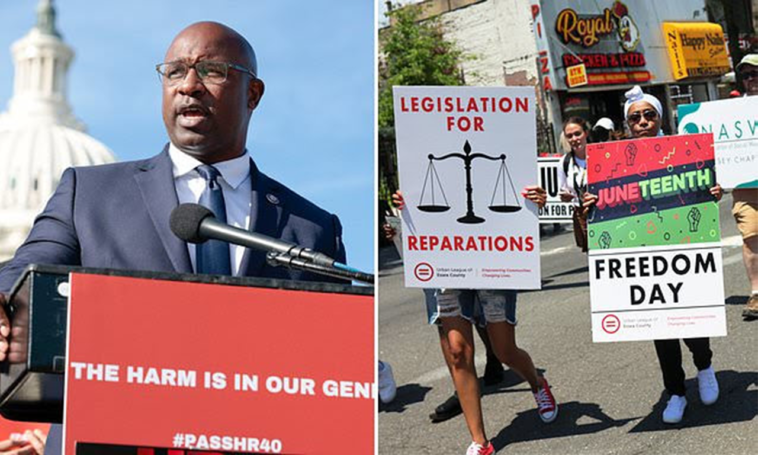Reparations have long been a topic of discussion in the United States, and Representative Jamaal Bowman’s recent proposal adds a new chapter to this ongoing debate.
His legislation, which seeks to allocate $14 trillion to almost 42 million black Americans as reparations, is a bold move that touches on historical injustices and their lasting impact on the African American community.
The figure of $14 trillion is derived from academic estimates of the economic gains the United States accrued from forced labor between 1619 and the abolition of slavery in 1865.
The bill aims to address the deep-seated racial disparities that persist across various sectors, including housing, education, and incarceration. Representative Bowman argues that such reparations are necessary to eliminate the wealth gap between Black and White Americans, emphasizing the economic foundation built on centuries of free labor.
One of the innovative aspects of Bowman’s proposal is the suggestion of “creative” ways to implement these reparations, such as spreading the payments over several years. The congressman draws parallels to the government’s response to crises like the COVID-19 pandemic, where massive investments were made to sustain the economy.
He contends that similar financial commitments can be made to rectify historical injustices without imposing additional taxes on the American people.
However, despite its passage in the House, the bill faces a significant hurdle: it lacks a Senate sponsor. Without bipartisan support, the legislation cannot advance further, underscoring the challenges associated with enacting reparations on a national level.
This echoes a historical pattern where bills proposing federal commissions to study reparations have languished for years without substantial progress.
The idea of reparations itself is not new. The concept centers on compensating the descendants of slaves for the injustices their ancestors endured, including forced labor, systemic discrimination, and institutionalized racism.
Evanston, Illinois, made history in 2021 by becoming the first city in the United States to implement a reparations program. The city allocated $10 million over a decade to eligible Black residents through $25,000 housing assistance grants. These grants aimed to address the historical impact of racist housing policies.
Similarly, San Francisco explored the possibility of reparations, with an advisory group recommending lump-sum payments, guaranteed annual income, and personal debt forgiveness for qualifying Black adults. However, the city faced challenges, with the reparations office losing funding.
The reparation discussion aligns with broader conversations about racial justice and equality in the United States. It forces a reckoning with the country’s historical sins and explores tangible ways to address the enduring effects of slavery and discrimination.
The bill introduced by Representative Bowman adds momentum to this conversation, raising questions about the government’s responsibility to rectify historical wrongs and the most effective means of achieving reparative justice.
While the proposed legislation focuses on financial reparations, it also underscores the broader issue of systemic racism and the need for comprehensive policies that address the root causes of racial disparities.
It highlights the complexity of rectifying historical injustices and the importance of engaging in a nuanced, inclusive dialogue to find solutions that promote equality and justice for all Americans.



One Comment
Leave a ReplyOne Ping
Pingback:Former Gop Representative Reaches New Low By Attacking Joy Reid’s Looks
Join the Community and Be a Part of the Conversation
You must be logged in or registered to post a comment.